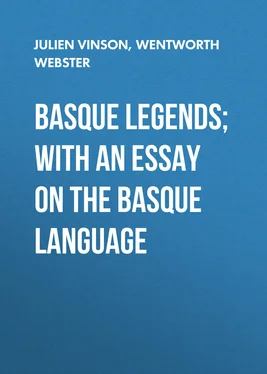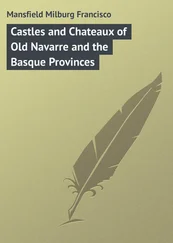Julien Vinson - Basque Legends; With an Essay on the Basque Language
Здесь есть возможность читать онлайн «Julien Vinson - Basque Legends; With an Essay on the Basque Language» — ознакомительный отрывок электронной книги совершенно бесплатно, а после прочтения отрывка купить полную версию. В некоторых случаях можно слушать аудио, скачать через торрент в формате fb2 и присутствует краткое содержание. Жанр: foreign_antique, Старинная литература, Мифы. Легенды. Эпос, на английском языке. Описание произведения, (предисловие) а так же отзывы посетителей доступны на портале библиотеки ЛибКат.
- Название:Basque Legends; With an Essay on the Basque Language
- Автор:
- Жанр:
- Год:неизвестен
- ISBN:нет данных
- Рейтинг книги:3 / 5. Голосов: 1
-
Избранное:Добавить в избранное
- Отзывы:
-
Ваша оценка:
- 60
- 1
- 2
- 3
- 4
- 5
Basque Legends; With an Essay on the Basque Language: краткое содержание, описание и аннотация
Предлагаем к чтению аннотацию, описание, краткое содержание или предисловие (зависит от того, что написал сам автор книги «Basque Legends; With an Essay on the Basque Language»). Если вы не нашли необходимую информацию о книге — напишите в комментариях, мы постараемся отыскать её.
Basque Legends; With an Essay on the Basque Language — читать онлайн ознакомительный отрывок
Ниже представлен текст книги, разбитый по страницам. Система сохранения места последней прочитанной страницы, позволяет с удобством читать онлайн бесплатно книгу «Basque Legends; With an Essay on the Basque Language», без необходимости каждый раз заново искать на чём Вы остановились. Поставьте закладку, и сможете в любой момент перейти на страницу, на которой закончили чтение.
Интервал:
Закладка:
The mistress comes. The new servant had done all the work, and she was very well satisfied with her. So she said to her:
“Choose which you would like, a sack of charcoal or a bag of gold?”
“A sack of charcoal is the same to me.”
“A star for your forehead, or a donkey’s tail?”
“A donkey’s tail would be the same to me.”
Then she gives her a bag of gold, and a beautiful star on her forehead. 51 51 Cf. Bladé’s “Contes Agenais,” “Les Deux Filles,” and Köhler’s “Notes Comparatives” on the tale, p. 149.
Then the servant goes home. She was so pretty with this star, and this bag of gold on her shoulders, the whole family was astonished at her. The eldest daughter says to her mother:
“Mother, I will go and be a servant too.”
And she says to her, “No, my child, you shall not do so.”
But as she would not leave her in peace (she assented), and she goes off like her sister. She comes into the city of the fairies, and meets the same fairy as her sister did. She says to her:
“Where are you going, my girl?”
“To be a servant.”
“Come to us.”
And she takes her as servant. She tells her like the first one:
“You will dig up the kitchen, break the plates, smash the pitcher, give the children their breakfasts by themselves, and dirty their faces.”
There was some of the breakfast left over, and the little dog comes in, and he went:
“Tchow! tchow! tchow! I too, I should like something.”
And he follows her everywhere, and she gives him nothing; and at last she drove him off with kicks. The mistress comes home, and she finds the kitchen all dug up, the pitcher and all the plates broken. And she asks the servant:
“What do you ask for wages? A bag of gold or a sack of charcoal? a star on your forehead, or a donkey’s tail there?”
She chose the bag of gold and a star on her forehead; but she gave her a sack of charcoal, and a donkey’s tail for her forehead. She goes away crying, and tells her mother that she comes back very sorry. And the second daughter also asks permission to go.
“No! no!” (says the mother), and she stops at home.
Estefanella Hirigaray.
The Fairy in the House
There was once upon a time a gentleman and lady. And the lady was spinning one evening. There came to her a fairy, and they could not get rid of her; and they gave her every evening some ham to eat, and at last they got very tired of their fairy.
One day the lady said to her husband:
“I cannot bear this fairy; I wish I could drive her away.”
And the husband plots to dress himself up in his wife’s clothes just as if it was she, and he does so. The wife goes to bed, and the husband remains in the kitchen alone, and the fairy comes as usual. And the husband was spinning. The fairy says to him:
“Good-day, madam.”
“The same to you too; sit down.”
“Before you made chirin, chirin, but now you make firgilun, fargalun.” 52 52 That is, the wife span evenly with a clear steady sound of the wheel, but the man did it unevenly.
The man replies, “Yes, now I am tired.”
As his wife used to give her ham to eat, the man offers her some also.
“Will you take your supper now?”
“Yes, if you please,” replies the fairy.
He puts the frying-pan on the fire with a bit of ham. While that was cooking, and when it was red, red-hot, he throws it right into the fairy’s face. The poor fairy begins to cry out, and then come thirty of her friends.
“Who has done any harm to you?”
“I, to myself; I have hurt myself.” 53 53 Cf. Campbell’s “The Brollachan,” Vol. II., p. 189, with the notes and variations. “Me myself,” as here, seems the equivalent of the Homeric “οὔτις.”
“If you have done it yourself, cure it yourself.”
And all the fairies go off, and since then there came no more fairies to that house. This gentleman and lady were formerly so well off, but since the fairy comes no longer the house little by little goes to ruin, and their life was spent in wretchedness. If they had lived well they would have died well too.
Estefanella Hirigaray.
The Pretty but Idle Girl. 54 54 M. Cerquand has the same tale, Part I., p. 41.
Once upon a time there was a mother who had a very beautiful daughter. The mother was always bustling about, but the daughter would not do anything. So she gave her such a good beating that she sat down on a flat stone to cry. One day the young owner of the castle went by. He asks:
“What makes such a pretty girl cry like that?”
The woman answers him:
“As she is too pretty she will not work.”
The young man asks if she knows how to sew.
She answers, “Yes; if she liked she could make seven shirts a day.”
This young gentleman is much smitten with her. He goes home, and brings a piece of linen, and says to her:
“Here are seven shirts, and if you finish them by such a time we will marry together.”
She sat thinking without doing anything, and with tears in her eyes. Then comes to her an old woman, who was a witch, and says to her:
“What is it makes you so sad?”
She answers, “Such a gentleman has brought me seven shirts to sew, but I cannot do them. I am sitting here thinking.”
This old woman says to her:
“You know how to sew?”
“I know how to thread the needle; (that is all).”
This woman says to her:
“I will make your shirts for you when you want them, if you remember my name in a year and a day.” And she adds, “If you do not remember I shall do with you whatever I like. Marie Kirikitoun—nobody can remember my name.”
And she agreed. She makes her the seven shirts for the appointed time. When the young man came the shirts were made, and he takes the young girl with joy and they are both married.
But this young girl grew continually sadder and sadder; though her husband made great feasts for her she never laughed. One day they had a frightfully grand festival. There came to the door an old woman, and she asks the servant:
“What is the reason that you have such grand feastings?”
She answers, “Our lady never laughs at all, and her husband has these grand feasts to make her gay.”
The old woman replied:
“If she saw what I have heard this day she would laugh most certainly.”
The servant said to her, “Stay here; I will tell her so at once.”
They call the old woman in, and she told them that she had seen an old woman leaping and bounding from one ditch to another, and saying all the time:
“Houpa, houpa, Marie Kirikitoun; nobody will remember my name.”
When this young lady heard that, she was merry at once, and writes down this name at once. She recompensed highly the old woman, and she was very happy; and when the other old woman came she knew her name. 55 55 This is a very widely spread legend. Cf. Patrañas, “What Ana saw in the Sunbeam;” “Duffy and the Devil,” in Hunt’s “Popular Romances of the West of England,” p. 239; also Kennedy’s “Idle Girl and her Aunts,” which is very close to the Spanish story; and compare the references subjoined to the translation of the Irish legend in Brueyre’s “Contes Populaires de la Grande Bretagne,” p. 159.
Estefanella Hirigaray.
The Devil’s Age
There was a gentleman and lady who were very poor. This man used to sit sadly at a cross-roads. There came to him a gentleman, who asked: “Why are you so sad?”
“Because I have not wherewith to live.”
He said to him, “I will give you as much money as you like, if at such a time you tell the age of the devil.”
Читать дальшеИнтервал:
Закладка:
Похожие книги на «Basque Legends; With an Essay on the Basque Language»
Представляем Вашему вниманию похожие книги на «Basque Legends; With an Essay on the Basque Language» списком для выбора. Мы отобрали схожую по названию и смыслу литературу в надежде предоставить читателям больше вариантов отыскать новые, интересные, ещё непрочитанные произведения.
Обсуждение, отзывы о книге «Basque Legends; With an Essay on the Basque Language» и просто собственные мнения читателей. Оставьте ваши комментарии, напишите, что Вы думаете о произведении, его смысле или главных героях. Укажите что конкретно понравилось, а что нет, и почему Вы так считаете.












